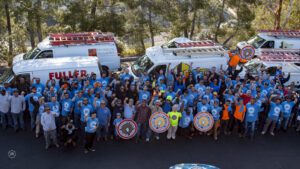Click here for a copy of our coalition letter to CARB.
May 6th, 2020
Mary Nichols, Chair, California Air Resources Board
1001 I Street Sacramento, CA 95814
RE: Support for CARB Heavy Duty Regulations and Stimulating Investment in High Road Jobs
Dear Chair Nichols and the California Air Resources Board:
On behalf of the undersigned groups we write in support of CARB’s ongoing heavy-duty rulemakings.
As we work together to keep our communities safe and healthy during the unprecedented novel coronavirus (COVID-19) crisis, we must not lose sight of the importance of addressing the public health crisis caused by harmful air pollution and climate change. Although some business groups representing polluting industries would seek to exploit the current public health crisis to weaken, stop, or unravel California’s environmental progress, we urge policymakers to remain steadfast. These rulemakings promise to improve our health and protect our climate, as well as stimulate the California economy. Moreover, we urge CARB to ensure that environmental policies address the needs of workers. Existing and forthcoming environmental regulations can help us to emerge from this crisis more equitable, greener, and more prosperous.
Specifically, we urge CARB not to delay or stop ongoing rulemakings. These rulemakings, particularly the Advanced Clean Trucks (ACT) suite of regulations, hold the potential to seed economic transformation in our state, and build and maintain middle-class jobs in ‘essential’ sectors where hard working Californians now struggle to survive. The agency should continue taking appropriate measures to maximize public participation as much as possible while advancing these important rulemakings. Rulemakings and CARB’s market-building incentives deliver stimulus and equity benefits when paired with proactive high-quality job policies.
WELL-STRUCTURED HEAVY-DUTY REGULATIONS PROVIDE STIMULUS BENEFITS
CARB’s zero emission (ZE) truck regulations can positively impact the livelihoods of workers throughout the transportation industry value chain. To improve and expand work in transportation subsectors, ZE truck regulations – including the ACT Manufacturer Rule, the ACT Reporting Requirement, and eventual Fleet Rule(s) – must be structured so that regulatory burden does not fall on workers and actually improves job outcomes. In the trucking sector, forthcoming fleet regulations can ensure that employers absorb the costs of the electric truck transition rather than allowing companies to force costs onto drivers. CARB has shown early willingness to consider such priorities, and is laying the ground for equitable fleet rules through an effective Reporting Requirement. Structuring rules fairly can drastically improve workers’ livelihoods and potentially increase truck driver take-home income by tens of thousands of dollars. Equitably structured rules also significantly improve compliance among trucking companies, as a recent UC Labor Center study shows1 . Greater compliance, in turn, improves EJ community health outcomes, and ZEV adoption.
Supportive policies could not come at a better time for California’s trucking workforce. According to the Bureau of Labor Statistics for 2019, US truck drivers earn low wages, approximately $47,000 annually.2 Major subsectors of the trucking industry pay far lower wages than the median however. Misclassified contractors – those drivers whose employers willfully and illegally misclassify them as independent contractors, though they are in fact employees – earn approximately $30,000 annually, before the costs of equipment, financing, and typical employee costs (including healthcare and payroll taxes).3
Misclassification of trucking contractors is rampant in California’s port trucking, package delivery, and long-haul subsectors – consigning tens of thousands of workers, predominantly workers of color, to modern-day indentured servitude. CARB’s ZE truck rulemakings can help mitigate the harmful effects of misclassification by steering trucking fleets towards more equitable business practices.
WELL-FUNDED INCENTIVES WITH HIGH ROAD JOB STANDARDS INCREASE STIMULUS EFFECT
Complementary to the ACT rulemaking, we urge ARB to consider ways to maximize benefits to workers from incentive programs. Well-funded incentive programs help build the market for heavy-duty zero emission vehicles and infrastructure. At present, however, incentives do not go far enough to leverage high road jobs for working people in affected markets, including vehicle manufacturing, vehicle driving, and infrastructure manufacture and installation. To maximize equity and stimulus benefits, policymakers should standardize or incentivize domestic manufacturing and assembly of vehicles and incentivize/standardize markers of high quality work, including family-sustaining wages, adequate fringe benefits, a safe workplace, a legally compliant workplace, etc.
Such policies maximize the return on ongoing and potential future investments. With certification requirements like the Electric Vehicle Installation Training Program (EVITP), investments in electric vehicle infrastructure can be assured to be installed safely while creating thousands of high road construction jobs in California. Similarly, for manufacture of vehicles, domestic content requirements, safety standards, and legal compliance standards can ensure growth and retention of quality jobs in the domestic and California-based supply chain. In driving, wage standards, legal compliance, and other standards can help pave the way for high road industry transition. High quality jobs stimulate broader economic benefit to both California workers and communities in the short and long term, as workers gain a stable career pathway, earn higher wages that recirculate in local economies, and overall require less public relief.
With the aforementioned policies in place, California’s forthcoming regulations and incentives, including the ACT truck regulations, will help turn the trucking, charging, and truck manufacturing industries green and equitable.
We urge CARB to continue forward with all due speed.
Thank you for your consideration,
Sam Appel
California Policy Organizer
BlueGreen Alliance
Shane Gusman
Director
California Teamsters Public Affairs Council
Ron Herrera
Director, President International Brother of Teamsters Port Division;
LA County Federation of Labor
Paul Cort
Staff Attorney
EarthJustice
Patricio Portillo
Policy Analyst
Natural Resources Defense Council
Elly Matsumura
California Director
Partnership for Working Families
Bill Magavern
Policy Director
Coalition for Clean Air
Neena Mohan
Climate Justice Program Associate
California Environmental Justice Alliance
Bernie Kotlier
Executive Director, Sustainable Energy Solutions
Labor Management Cooperation Committee IBEW-NECA California & Nevada
Derrick Robinson
Senior Research & Policy Analyst
Center on Policy Initiatives
Jeremy Abrams
Business Manager
IBEW Local 569
Jennifer J. Kropke, Esq.
Director of Workforce and Environmental Engagement
IBEW Local 11; National Electrical Contractors Association LA LMCC
Roxana Tynan
Executive Director
Los Angeles Alliance for a New Economy


